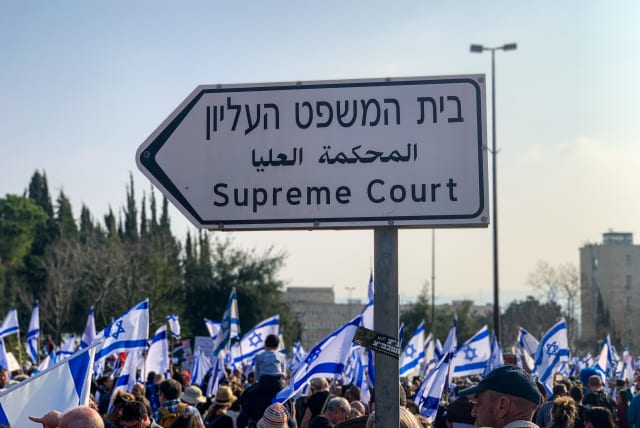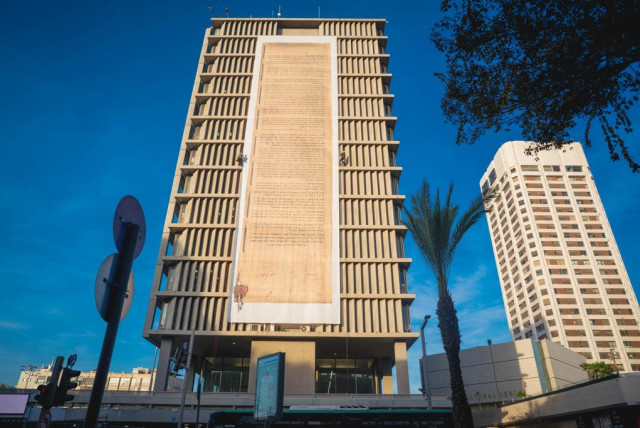Why are Israelis not protected by due process of law? - opinion

Israelis may not yet be ready to agree on a full written constitution, but defining due process and reviewing that sufficient procedures are applied may provide Israel with basic checks and balances.
Although much has been written and spoken about the Israeli judicial reform crisis, it is still hard to put a finger on the real problem. Pro and anti-reformists each claim their way is more democratic. Perhaps the problem is lack of due process in Israel. Due process is an important principle in both the UK and US and may offer a way out the present impasse in Israel.
Many IDF reservists are no longer willing to volunteer for duty as pilots, etc. They fear being arrested if they travel to any of the 195 Interpol countries and being tried there or at the International Criminal Court in the Hague. This is possible if Israel is perceived to no longer to have an independent impartial judiciary.
How did this happen? Among other things, the IDF was reportedly not allowed to present its assessment to the Knesset Foreign Affairs & Defense Committee before the passing of the Basic Law: Judgment (Amendment 3)(Reasonableness Standard), on July 24, 2023.
The Israeli Declaration of Independence stipulates:
“The State of Israel will be open for Jewish immigration and for the Ingathering of the Exiles; it will foster the development of the country for the benefit of all its inhabitants; it will be based on freedom, justice and peace as envisaged by the prophets of Israel; it will ensure complete equality of social and political rights to all its inhabitants irrespective of religion, race or sex ….”
“Freedom, justice, and peace” are all presumably meant to apply to Israelis who served in the IDF and travel abroad, not only if they stay put in Israel. Due process for this is necessary.
Will Israel ever get due process?
Will the Knesset lay down what is due process? Or is it possible the High Court of Justice will do so in its upcoming hearing on the reasonableness amendment, starting September 12? Or could President Herzog suggest this?
David Ben-Gurion said in a 1949 speech to the Knesset: “By now we already more or less have a constitution, though maybe not a complete one…We chose a parliamentary form of government. The nation decides on the laws, and their representatives implement them. I don’t think it’s possible to delegate authority to the court to decide whether the laws are kosher or not kosher.” (https://mosaicmagazine.com/observation/israel-zionism/2021/03/against-court-and-constitution-a-never-before-translated-speech-by-david-ben-gurion/)
If so, the question becomes: What is the due process for the Knesset to decide on the laws? Could the courts can then (merely) review whether sufficient procedures were followed? Were all material factors considered? What about international treaty and other obligations? Is the result “freedom, justice, and peace”?
In England, the phrase “due process of law” first appeared in a statutory rendition of the Magna Carta in 1354, during the reign of King Edward III, as follows:
“No man of what state or condition he be, shall be put out of his lands or tenements nor taken, nor disinherited, nor put to death, without he be brought to answer by due process of law.” (https://en.wikipedia.org/wiki/Due_Process_Clause#cite_note-7)
In the US, the Fifth Amendment to the US Constitution provides: “No person shall ... be deprived of life, liberty, or property, without due process of law.” This was at the federal level, so it was expanded after the US Civil War to apply at state level, too, under the Fourteenth Amendment with the words: “...nor shall any state deprive any person of life, liberty, or property, without due process of law.”
The Fourteenth Amendment’s due process clause guarantees procedural due process, meaning that government actors must follow certain procedures before they may deprive a person of life, liberty, or property interest. The Supreme Court has also construed the clause to protect substantive due process, holding that there are certain fundamental rights that the government may not infringe even if it provides procedural protections.
The Fourteenth Amendment also prohibits states from depriving any person of life, liberty, or property without due process of law. The Supreme Court has held that this protection extends to all people, regardless of race, color, or citizenship.
Israelis learn in the IDF how to improvise. Israel’s Basic Laws are arguably a poorly improvised constitution. Israelis may not yet be ready to agree on a full written constitution, but defining due process and reviewing that sufficient procedures are applied may provide Israel with basic checks and balances.
Leon Harris is an accountant who has studied constitutional affairs. leon@hcat.co.
Jerusalem Post Store
`; document.getElementById("linkPremium").innerHTML = cont; var divWithLink = document.getElementById("premium-link"); if (divWithLink !== null && divWithLink !== 'undefined') { divWithLink.style.border = "solid 1px #cb0f3e"; divWithLink.style.textAlign = "center"; divWithLink.style.marginBottom = "15px"; divWithLink.style.marginTop = "15px"; divWithLink.style.width = "100%"; divWithLink.style.backgroundColor = "#122952"; divWithLink.style.color = "#ffffff"; divWithLink.style.lineHeight = "1.5"; } } (function (v, i) { });

